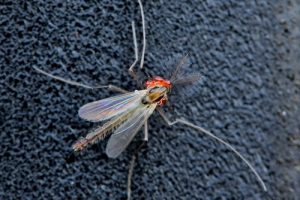Mosquitoes or Midges?
By Chris Williams on April 22, 2011.
Q. Last evening, sitting on the deck of our vacation rental, we were suddenly attacked by a swarm of mosquitoes. We finally had to flee inside. Nobody got bitten but they were buzzing all around. Do mosquitoes travel in packs?
A. No, mosquitoes don’t usually travel in swarms unless you live near a heavily mosquito-infested area like a swamp – and you’d know if that were the case! You were probably visited by a swarm of midges, not mosquitoes. Midges are small slender flies that look a lot like mosquitoes and they even make that annoying buzzing sound in your ear like mosquitoes. But they don’t bite; they don’t have the long proboscis or beak that mosquitoes use to suck blood. (Actually, there is a group of small, unrelated flies called biting midges – but that’s another blog!) In fact, non-biting midges are the main insects that people capture in their backyard “bug zappers,” mistakenly thinking they are zapping mosquitoes by the hundreds.
 The wormlike larval stage of the midge fly is aquatic or semiaquatic, feeding on algae in lakes, ponds, or along shorelines. The larvae are an important food for fish. When the adult midges emerge, they tend to do so all at once, in large “hatches” or swarms around sunset. On warm spring or summer evenings, there may be thousands of midges hovering in a cloud. The swarms can last for a few minutes or a few hours. Any one species of midge may have several different hatches spread over a period of one to two weeks. Waterfront residents, especially, have a problem with midges around their homes and docks.
The wormlike larval stage of the midge fly is aquatic or semiaquatic, feeding on algae in lakes, ponds, or along shorelines. The larvae are an important food for fish. When the adult midges emerge, they tend to do so all at once, in large “hatches” or swarms around sunset. On warm spring or summer evenings, there may be thousands of midges hovering in a cloud. The swarms can last for a few minutes or a few hours. Any one species of midge may have several different hatches spread over a period of one to two weeks. Waterfront residents, especially, have a problem with midges around their homes and docks.
Midges are attracted to lights and light-colored objects or walls. You may find them by the hundreds resting on a white wall. Using lower wattage lights and moving or shielding outdoor lights away from docks, doorways, patios, and areas where people gather can help. Leaving outside lights off until an hour after sunset will avoid the period of greatest midge activity.
It’s difficult to control swarms of midges since new midges can emerge daily for several days. Outdoor spraying is not very effective. Sometimes, the bodies of water where midge larvae develop can be successfully treated with biocontrol agents. Midges are mostly a temporary pest and one of the trade-offs of living near the water.